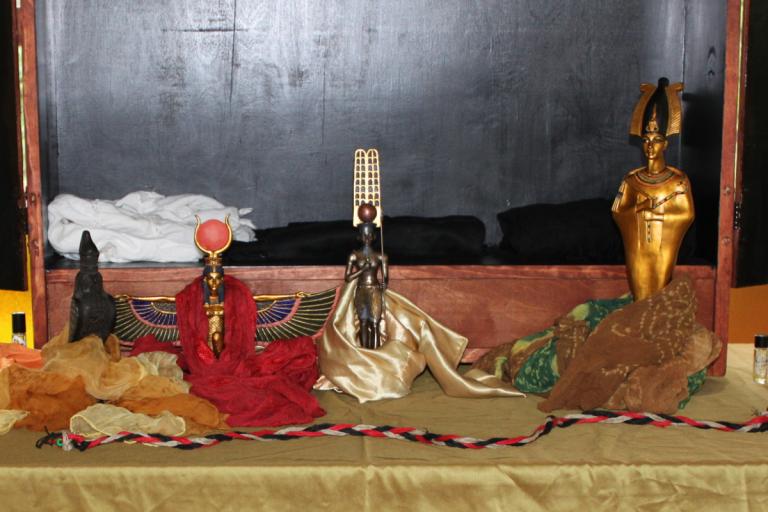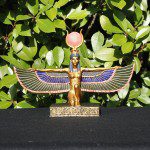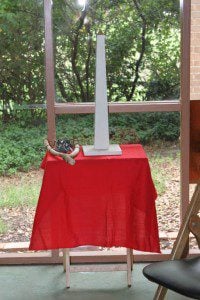 Over the years I’ve been blogging I’ve written about Denton CUUPS’ Egyptian Summer Solstice on numerous occasions: our public presentation at White Rock Lake in Dallas in 2009, our prayer for Egypt after the overthrow of Mubarak in 2011, our presentation of the Prophecy of Hermes Trismegistus last year, and last week’s post on how this became our Summer Solstice tradition.
Over the years I’ve been blogging I’ve written about Denton CUUPS’ Egyptian Summer Solstice on numerous occasions: our public presentation at White Rock Lake in Dallas in 2009, our prayer for Egypt after the overthrow of Mubarak in 2011, our presentation of the Prophecy of Hermes Trismegistus last year, and last week’s post on how this became our Summer Solstice tradition.
While it’s probably clear – from the pictures if not from the descriptions – that this isn’t a generic Pagan liturgy, I’ve never talked much about just what it is and why it’s different. I’d like to do that today, in large part because the differences are relevant to devotional polytheists, regardless of which traditions and which Gods we follow.
I’m a Celtic-inspired Druid, not a Kemetic priest and certainly not an Egyptian scholar. I have eleven years of working with these deities through this rite, but I am still no expert on the subject. If you find this helpful, use it as inspiration for your own deeper exploration of the Gods you follow, not as holy writ.
What we consider ancient Egypt existed for an incredibly long time. The last Pharaoh (30 BCE) is far closer in time to us than to the first Pharaoh (3200 BCE) – give that a minute to sink in. While the pace of change was very slow by our standards, things did change. Different Gods were worshipped in different ways at different places; some were conflated together while others diverged into multiple identities. There was no single ancient Egyptian religion and it should come as no surprise there is no single modern Egyptian religion either.
Our liturgy is drawn primarily from the Pyramid Texts, the Coffin Texts, and the Book of Going Forth By Day. It begins with the idea that the Gods are real and they are present in their statues. Therefore we treat the statues with the dignity and respect due a God. They are not left out in the open but are kept in Their own houses – in our case, a special cabinet.
They are cared for by the priests who have learned the reverent and proper (i.e. – polite and effective) ways to approach these mighty beings.
I come before thee, O great Neteru, my purification upon my arms. Assuredly, I am a priest of this temple. I shall not linger, I shall not turn back. I have come to perform the ritual, and I have not come to do that which is not to be done.
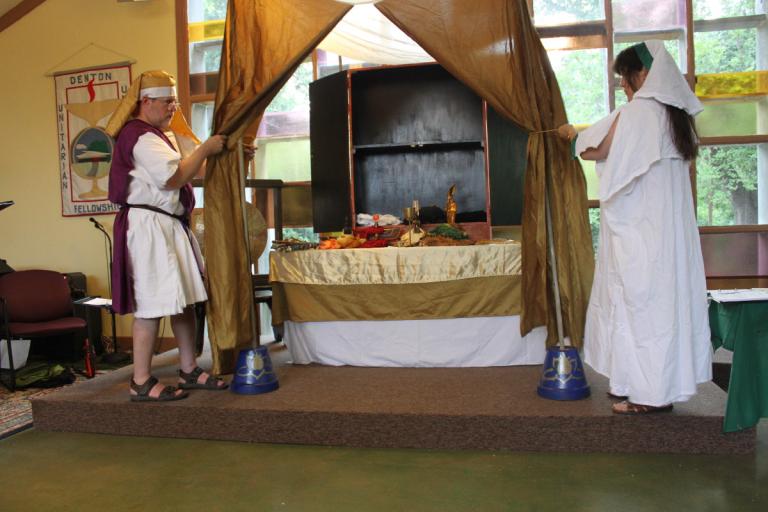 The Gods are awakened, anointed, and dressed – wrapped in a sacred cloth.
The Gods are awakened, anointed, and dressed – wrapped in a sacred cloth.
We come to honor You. Awake, we ask, that You may hear the song of Ma’at. Grace us with Your countenance, let us praise it, so as to proclaim Your power, so as to let posterity know Your might. I place my hands upon You in the name of the Gods. May Your Ba swoop from the Duat this day and every day and fill this place.
The Gods are not human – though some legends say some deities were human at one point – but we care for Them as though they were human because that’s what we are. We honor them in the ways we know how, showing them proper hospitality and encouraging reciprocity.
This bread is for You, O Great Gods. May You be nourished by this gift, that You may nourish Your people in return.
This beer is for You, O Great Gods. May You be refreshed by this gift. We present that which flows forth from You, that Your hearts shall continue to beat. For it is with You that all comes forth at the sound of Your voice.
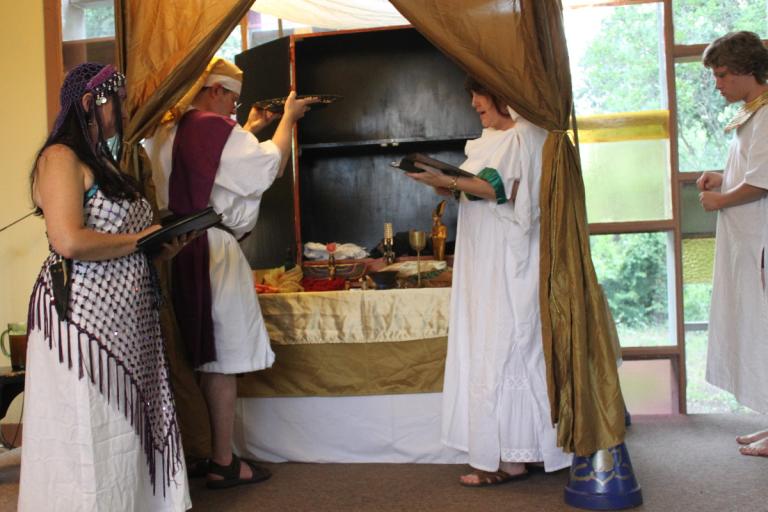 Since this is not just any day but a holy day, this ritual included a special observance. This year we told the story of how Isis learned to heal the sting of a scorpion and so kept the infant Horus alive. And we told the story of how She learned that the laws of Ma’at apply even to the Gods.
Since this is not just any day but a holy day, this ritual included a special observance. This year we told the story of how Isis learned to heal the sting of a scorpion and so kept the infant Horus alive. And we told the story of how She learned that the laws of Ma’at apply even to the Gods.
At this point the food and drink has been in front of the Gods for an appropriate period of time. They have not physically consumed it, so we practice the Egyptian tradition of Reversion of Offerings and share it with all those in attendance.
O Most Revered Gods of Egypt, You have taken sustenance from our offerings, and You have imbued them with Your divine power. For this, O Gods, we thank You.
Worshipers of the Gods of Egypt, let us now partake of Their blessings.
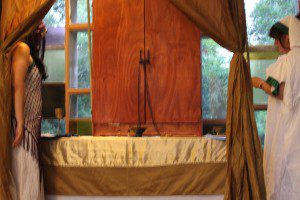 As the ritual comes to a close, the statues are carefully and reverently returned to their home.
As the ritual comes to a close, the statues are carefully and reverently returned to their home.
As Horus has defeated Set, neither shall any enemy, male or female, enter into this sanctuary. We close the door, we set the seal.
We have left, with Your great faces behind us.
The outcome of these rituals has been strong and tangible. I sometimes wonder what would happen if we devoted ourselves fully to these Gods and performed the daily temple ritual on a daily basis. There are polytheists who are doing just that, some with the Neteru and some with the deities of other traditions. Though there are daily elements to my spiritual practice, it does not reach this level of devotion.
Should it? That’s a very hard question that deserves more prayerful contemplation.
And what does all this mean to the average modern Pagan? What relevance does a 4000 year old ritual have to us here and now? Here are the closing words from our ritual.
For the ancient Egyptians, life was never certain. Food, water, and the next harvest were not guaranteed. The daily temple rituals insured that the sacred order of Ma’at would be maintained and that civilization would continue.
Our modern lives are far less fragile: technology keeps the elements at bay, and our most common problem is too much food, not too little. Yet we are not so different from our Egyptian ancestors, and we still struggle to maintain balance in our work, with our families, in our country, and on our planet. By the performance of our rituals and our daily spiritual practices, we maintain the sacred order of Ma’at in our lives and in our land.


